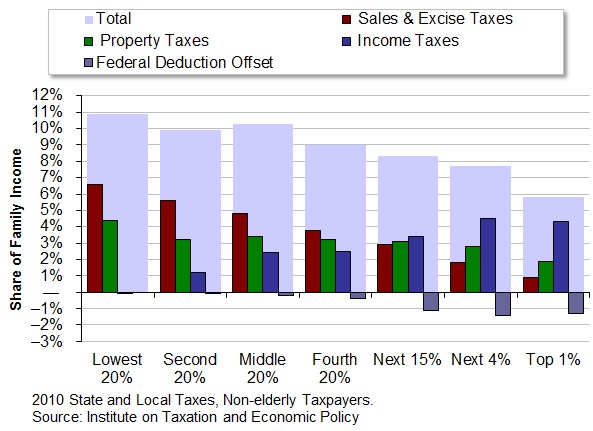State tax revenue:
- Individual income tax – $1.8 billion
- Sales and use tax – $1.6 billion
- Gas and fuel taxes – $322 million
- Corporate income tax – $235 million
- Other state taxes[1] – $214 million
Major local tax revenue:
- Property tax – $3.2 billion
- Local option sales tax – $340 million
- Inheritance tax – $43 million
National ranking, state/local taxes: 22nd as share of personal income
Nebraska’s tax system is regressive
Sales tax
Rate: 5.5% with up to 2% additional local option[1]
National ranking: 28th as share of personal income
What’s taxed: Goods, some services
What’s not: Many services, food
More about the sales tax:
- $4.1 billion in exemptions reported in 2012. Many are business inputs.
- Quarter-cent sales roads diversion started July 1
- $98 million lost yearly in untaxed Internet/catalog sales[2]
- State taxes 77 out of 168 services taxed elsewhere. [3] Loss of $450 million-$500 million in potential revenue[4]
Personal income tax (PIT)
Rates (for married couples filing jointly, beginning 2014):
- 2.46% up to $5,999 income
- 3.51% from $6,000 to $35,999
- 5.01% from $36,000 to $57,999
- 6.84% for income more than $58,000
National ranking: 25th as share of personal income
More about the individual income tax:
- 59% of Social Security benefits exempt[5]
- Standard Deduction – $11,900 for married couple in 2012
- Personal Exemption Credit – $123 per exemption in 2012
- Earned Income Tax Credit (EITC) – 10% of federal EITC
- Itemized deductions for items like mortgage interest and medical expenses
- Special deductions for items like college savings plans, special capital gains
Corporate income tax (CIT)
Rate: 5.58% on first $100,000 of taxable profit, 7.81% on amounts above $100,000
National ranking: 33rd as share of personal income
Who pays: Mostly large, publicly-traded companies
Who doesn’t: S-Corps, partnerships, LLCs. Such businesses pay through the personal income tax
Business incentives: Nebraska Advantage Act, other programs reduce CIT/other taxes for qualifying companies
Property tax
Rate: Varies by locality. Raises more money than any state tax.
National ranking: 17th as share of personal income
Levies:
- Total levy limits – $2.06-$2.19 per $100 of property value
- $1.05 limit for school districts
- 50-cent limit for counties and subdivisions, municipalities
- Other limits for smaller governments like natural resources districts and community colleges
- Levies can be overridden by local voters
Gas tax
Rate: 26.3 cents per gallon for second half of 2013
National ranking: 24th
Inheritance tax
Rates:
- Spouses — exempt
- Close relatives and siblings – first $40,000 exempt, 1% on remainder
- Remote relatives – first $15,000 exempt, 13% on remainder
- Non-relatives – first $10,000 exempt, 18% on remainder
Nationally: Five other states have inheritance taxes. 13 have estate taxes — Nebraska does not
County impact: Ranges from less than 1% to more than 20% of county budgets
[1] Includes excise taxes on alcohol, tobacco, and keno, business and franchise taxes, and insurance premium tax.
[2] National Conference of State Legislatures, Collecting E-Commerce Taxes: An Interactive Map. Based on state and local sales tax collections in 2012, the state’s share is approximately 83 percent, or $98 million of the $118 million total estimated by NCSL.
[3] Federation of Tax Administrators, Sales Taxation of Services, 2007 Survey
[4] Bill Lock, Memo Re: LR161, LR166, & LR 97 (Committee on Revenue: December 2009). Estimates have varied. The 2002 Tax Expenditure Report estimated $791 million, but this included many services, such as medical services, that are not considered feasibly taxable. Another estimate that looked only at a list of 30 services commonly taxed in Nebraska’s border states estimated that expanding the sales tax to those services would generate $60 million per year. Estimates focusing on all feasibly taxable services have come in between $450 million and $500 million.
[5] This percentage is a statewide total. Amount exempted varies from 15% to 100% based on a family’s income. A federal calculation is used to determine the amount of Social Security benefits included/excluded in Adjusted Gross Income. NE Department of Revenue Statistics of Income. Table B4: Individual Income Tax Data by Size of Adjusted Gross Income, all returns, tax year 2011.

